Harris Center For Infant Mental Health
Overview | Faculty | Orleans Parish Infant Team | Young Children and Military Families | Developmental Disorder Assessment | On-Going Community Engagement | Training Collaborations | Head Start Consultation | Community Parent-Child Groups | Resources | Curriculum
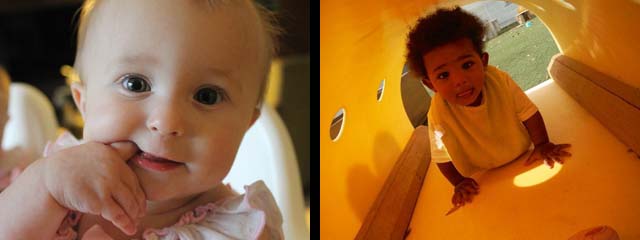
Overview
Over two decades ago, the LSUHSC Department of Psychiatry began the Harris Center
for Infant Mental Health that offers training to predoctoral psychology interns (through
an APA approved infant-child internship), child psychiatrists (as a required part
of their residency training program), post-doctoral psychologists, social workers,
licensed professional counselors, and other professionals seeking infant mental health
specialization. The program is multidisciplinary and unique in fulfilling requirements
for psychology and child psychiatry training programs being the first predoctoral
internship in infant mental health recognized and approved by both the American Psychological
Association (APA) and Association of Psychology Postdoctoral and Internship Centers
(APPIC). The child psychiatry rotation began as a six-month experience; however, after
learning how much residents were benefiting from the rotation, the child psychiatry
faculty made it a mandatory part of training. All trainees, from all disciplines,
consistently rank their experience in the Harris Center for Infant Mental Health a
top part of their training.
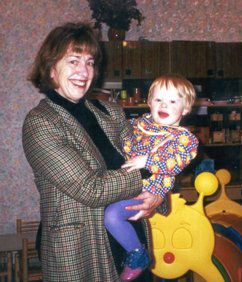
During the infant mental health training, clinicians learn how to conduct infant and
parent/caregiver-child relationship evaluations and provide treatment for young children
(under 6 years) and their parents or caregivers using evidence-based practices. Education
includes didactics and clinical experiential work every week related to developmental
context, behavioral and emotional issues, and the etiology and expression of psychopathology.
The training program includes: 1) weekly didactics; 2) development of clinical skills;
3) knowledge gained from infant observation; 4) achievement of evidence-based practices
in infant mental health; and 5) participation in both individual and group reflective
supervision. Trainees learn the importance of observational skills in diagnosis and
treatment of infants, young children, and families and come to understand when a child
is referred with behavioral or emotional dysregulation that “behavior has meaning”
for both the clinicians and the parents with whom they work. Trainees also learn more
about normative infant development in addition to psychopathology by following the
development of a low risk, normally developing baby as a basis for understanding disruptions
in development. During the course of their training, trainees assess and provide treatment
for at least two young children under the age of 6 years with their parents or caregivers.
Trainees learn child-parent psychotherapy (CPP), a relationship-based approach, which
is the primary treatment of choice within the program. If a trainee successfully completes
the CPP requirements, they can be rostered in CPP at the end of the training year.
All trainees are also taught other evidence-based treatments such as Parent-Child
Interaction Therapy, Attachment and Biobehavioral Catch-Up, and parenting interventions
such as Circle of Security. For psychiatrists, they learn alternatives to medication
management; trainees from other disciplines are exposed to information about when
medications are considered and ways that this approach can also support treatment
for older children. Additionally, trainees learn to diagnose children, if needed,
using the DC:0-5 classification system.
Faculty
This is our current Harris Center Infant Mental Health Faculty:
Director:
Joy D. Osofsky, Ph.D
(504) 296-9011
josofs@lsuhsc.edu
Co-Director:
Amy Dickson, Psy.D.
(504) 458-0906
adicks@lsuhsc.edu
Coordinator:
Amy Rinner, Psy.D.
(504) 272-7664
arinn1@lsuhsc.edu
Faculty:
Amy Alvarez, LCSW
Chikira Barker, M.A
Kristin Callahan, Ph.D.
Gerard Costa, Ph.D.
Richard Costa, Psy.D., MP
Sharon Crane, LOTR, BCP
Sebastian Del Corral, Psy.D.
Amy Dickson, Psy.D.
Diane Franz, Ph.D
Amy Huffer, Ph.D.
Mindy Kronenberg, Ph.D.
Lakisha Mamon, M.D.
Christy Mumphrey, MD
Joy Osofsky, Ph.D.
Lisa Phillips, MSW, LMSW
Amy Rinner, Psy.D.
Kathy Robison, Ph.D.
Hannah Scott, M.D.
Jayne Singer, Ph.D.
Phillip Stepka, Psy.D
Krystal Vaughn, Ph.D.
Deborah Weatherston, Ph.D.
Orleans Parish Infant Team
The LSU Health Sciences Center (LSUHSC) Department of Psychiatry Infant Team has been
continuously funded to provide infant mental health services to all children ages
0-5 years in foster care in Orleans parish since May 1998. In January of 2019, the
Infant Team expanded to treat young children in three parishes on the North Shore.
As of June 30, 2019, the Infant Team had worked with 280 families with children in
foster care. This equates to 430 children referred, with 384 children actually engaging
in evaluation and/or treatment. Over the years, the Infant Team has supported the
court efforts in helping to attain 100% permanency with all of the children referred
to the LSUHSC program by being reunified with either their biological parent(s), adopted
by a relative, or by a non-relative foster parent. Once permanency has been achieved,
to our knowledge the children have not returned to custody. This team is also a part
of one of the early Baby Courts and is a model for best services for young children
in foster care.
Additional information about our Infant Team
Young Children and Military Families
LSUHSC clinicians provide mental health consultation services for military children
and their families at the Belle Chasse Naval Air Station/Joint Reserve Base in Plaquemines
Parish, LA. Clinicians provide both center and school-based consultation and direct
services to elementary school-aged children (K-8), as well as children aged 6 weeks
– 5 years of age at the Child Development Center (CDC) located on base. Consultation
services are available in cases of classroom management, difficult child behaviors,
and the integration of individualized accommodations into the classroom. Individualized
treatment, group services and trainings are also available for a variety of conditions
and topics. Areas of consultation, treatment and training expertise include, but are
not limited to, managing disruptive and socially isolating classroom behaviors, integrating
personalized accommodations and treatments into the classroom setting, social-emotional
education with expertise in the training and implementation of social skills, and
parental and teacher consultation, child-parent psychotherapy, cognitive-behavior
therapy, and social skills groups when needed.
Developmental Disorder Assessment
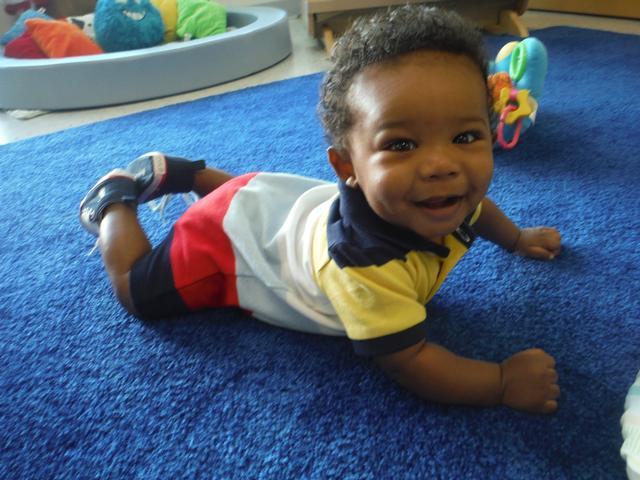
Harris Center for Infant Mental Health trainees are taught “gold-standard”, empirically
informed, standardized assessments of gross and fine motor, language, communication,
social interaction, and cognitive ability in order to provide a highly accurate picture
of current functioning in young children. Trainees then demonstrate competence administering
developmental measures and are closely supervised conducting full-length psychological/developmental
assessments with children ages 6 weeks to 6 years of age through LSU Department of
Psychiatry Assessment Clinic. Common young child referrals for assessment include
differential diagnosis of autism spectrum disorder and developmental delays, post-traumatic
stress disorder and trauma reactions, and disruptive and aggressive behaviors. Heavy
emphasis is placed on the possible effects of trauma, home environment, cultural perspectives,
and parenting throughout the assessment process. Developmental assessments offer both
the patient’s family and referring provider with valuable information regarding appropriate
diagnoses and concerns in order to guide more specific treatment and referral recommendations
(i.e. school accommodations, speech/occupational/physical therapies, medication changes,
more specific evaluations).
On-Going Community Engagement
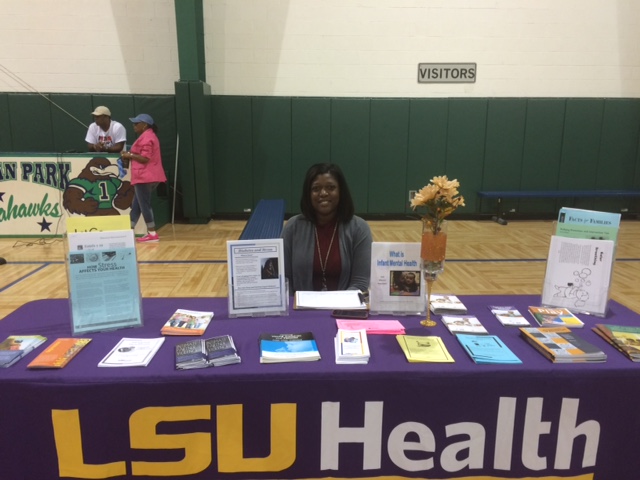
The LSUHSC Harris Infant Mental Health Program has played an important role in raising
awareness of the needs of very young children, which has been evidenced by a managed
health care provider for Louisiana requested over 3 years of infant mental health
and child parent psychotherapy training from the LSUHSC Harris Center across the state
in order to be eligible for reimbursement for therapeutic services for children from
birth through 6 years. Further, with changes in funding and managed care companies
in the past year, additional and continued training has been requested by more than
three agencies which is notable given the significant funding constraints in the state.
All providers who deliver these services are reimbursed.
The Infant Mental Health Outreach Team seeks to improve community knowledge and increase
awareness on important infant mental health issues. In addition to providing training
to community organizations on topics pertaining to infant mental health, the focused
outreach team attends community meetings and summits, community baby showers and “mother-to-be”
activities, resource and health fairs, and Head Start and school events to provide
educational information, consultations to families and professionals, and direct families
in need to available mental health resources in their community.
Training Collaborations
In addition to the training offered at LSUHSC through the Harris Center for Infant
Mental Health in New Orleans, several faculty play an active role in CPP training
throughout the state of Louisiana, across the Gulf Coast, and as national CPP trainers
around the country. Infant mental health training has been provided to communities
throughout the Gulf Coast through a collaborative effort between Louisiana and Florida
with additional funding provided for 5 years for the Mental and Behavioral Health
Capacity Project which was part of the Gulf Region Health Outreach Program funded
as part of Medical Benefits Class Action Settlement, which was approved by the U.S.
District Court in New Orleans on January 11, 2013 and became effective on February
12, 2014. For many of these communities, as well as those in rural Louisiana, this
training and consultation provided their first exposure to professionals who can help
with their questions and needs related to young children. The team has been able
to outreach and provide much needed and appreciated consultation to rural Head Start
and pre-K Centers, Kindergarten teachers and school counselors in rural communities,
and has been able to reach many immigrants and more isolated populations through work
in federally qualified health clinics. Outreach in community clinics led to the formation
of play groups to help isolated families who often have little family support with
socialization while encouraging healthy development in their young children. Outreach
to community clinics has also resulted in collaboration with pediatricians which has
led to cross disciplinary learning and greater problem-solving related to ways to
best serve the diverse clients in clinics with increasingly greater needs. This collaboration
allows the development of a medical home for families helping the clinic staff meet
more needs than just catching up with their child’s immunizations.
Head Start Consultation
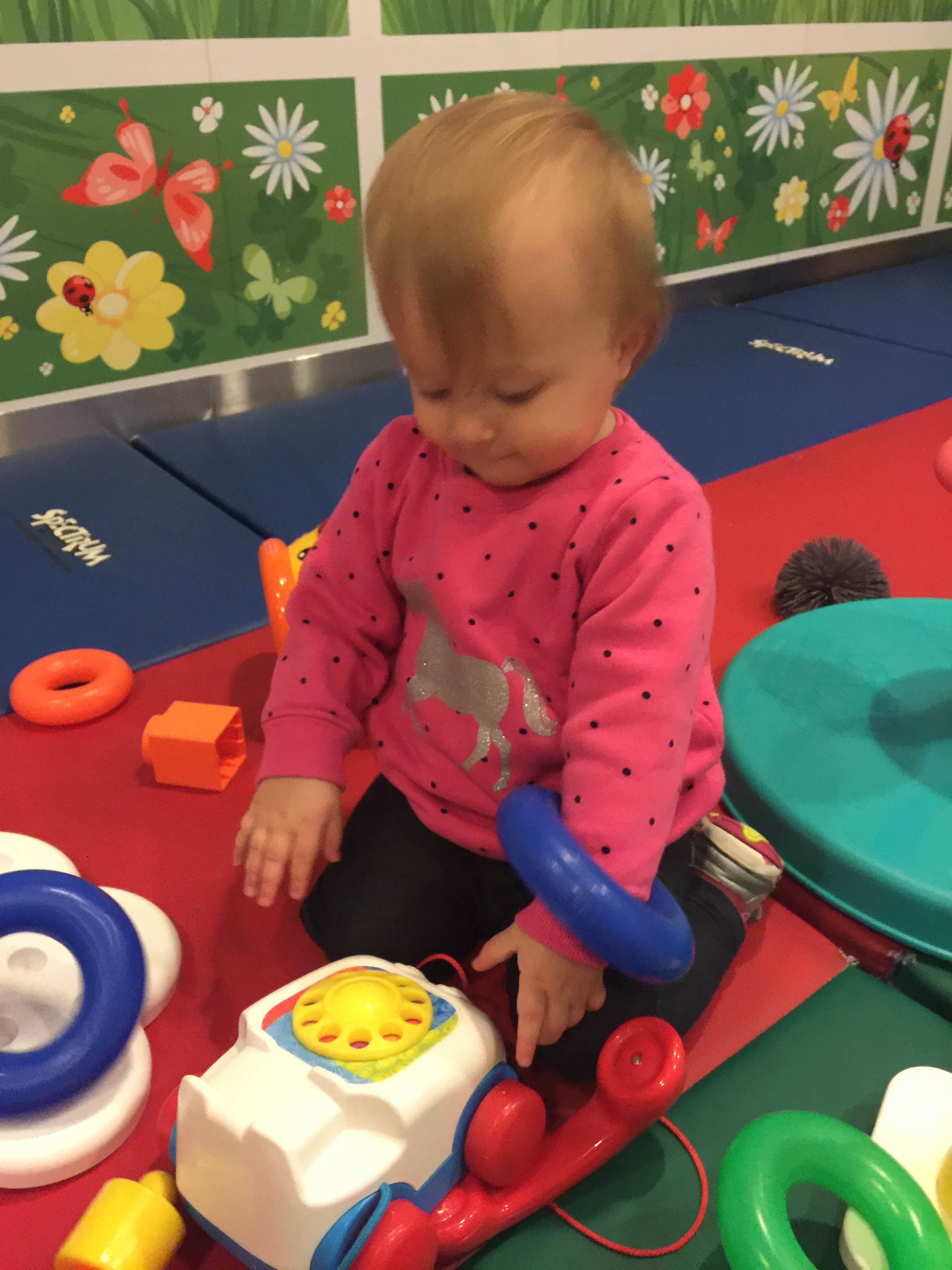
As part of the partnership between Louisiana State University Health Sciences Center
(LSUHSC) and Lafourche Parish Head Start, licensed clinicians from LSUHSC are currently
consulting in all Lafourche Parish Head Start Centers for the 2014-2015 and 2015-2016
school years. LSUHSC clinicians are routinely on-site at a Head Start on a weekly
basis. During each visit, consultants observe classrooms and consult with center teachers,
administrators, and participant parents to discuss a wide variety of issues. These
issues include, but are not limited to: student mental health or developmental concerns,
parenting education and guidance, and classroom management and organization. LSU clinicians
also provide trainings at quarterly staff meetings that include, but are not limited
to: how to identify and accommodate Autism Spectrum Disorder and other developmental
delays, difficult classroom behaviors, interfacing with parents of students, fetal
alcohol syndrome (FAS), loss and grief in early childhood, and using positive behavior
strategies in the classroom. LSU Clinicians also utilize “reflective supervision”
within training sessions to empower Lafourche Parish Head Start teachers and administrators
to feel more confident in their ability to manage difficult child/parent situations
without the presence of a licensed clinician. The reflective supervision is a widely
accepted and utilized model within young child programs to develop the context for
learning and professional development. Teachers and administrators alike are encouraged
to discuss difficult cases, interactions and child presentations in order to learn
from each other and build capacity. The core components of reflective supervision
that lead to its success are reflection, collaboration, and regularity. As a result
of this outreach effort, Lafourche Parish Head Start has asked LSUHSC clinicians to
partner with local pediatricians and mental health clinicians to form a “Mental Health
Head Start Collaborative” in order to collaborate on issues of infant mental health
in Lafourche parish.
Community Parent-Child Groups
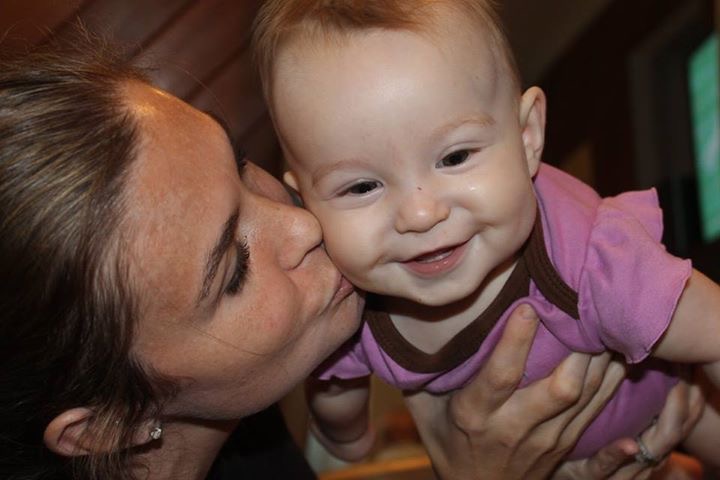
Through the LSUHSC Young Child Program established in Federally Qualified Health Clinics
LSU clinicians offer monthly bilingual parent-child groups in two primary care clinics
and are open to the public. Parents and their young children meet to play in a child-friendly
environment to openly discuss the development of their young children. Discussions
are conducted in parents’ native language (English, Spanish, and Vietnamese) and any
questions and/or concerns are encouraged within the group alongside available LSU
infant mental health clinicians. Information dissemination occurs on an as needed
basis. Parents commune together, support one another, and exchange failures and successes
in child rearing. Available clinicians are often directed questions regarding feeding/weight
gain, attachment promotion, infant irritability/fussiness, and possible delays in
development. Clinicians are available for follow-up at the clinic and at-risk families
who are patients of the clinic are encouraged to attend parent-child groups by their
primary care provider for additional support.
Resources
The following handouts have been created by member’s of our Harris Infant Mental Health
Team. Resources are created for use by both clinical professionals and parents and/or
families.
Recent Publications
-
Osofsky, J.D., Osofsky, H.J., Frazer, A., Olivieri, M., Many, M., Selby, M., Holman, S. & Conrad,
E. (February-March, 2021). The importance of ACEs in an intervention program during the perinatal period. American Psychologist, 76, 350-363.
-
Osofsky, J.D. (October 2018) The traumatic effects of child-parent separation and the importance of the relationship. Zero to Three Journal,70-74
-
Osofsky, J.D. (September 2020). PERSPECTIVES—Supporting Young Children, Families, and Caregivers Related to the COVID-19
Pandemic. Zero to Three Journal.
-
Osofsky, J.D., Keyes, A.W., Trigg, A.B., Dickson, A. B., & Mamon, L.Y. (December 17, 2020). Telehealth
During COVID-19: Advantages, Challenges, and Barriers Across Zero to Three Programs,
Zero to Three Journal.
-
Osofsky, J.D., Goldman Fraser, J., Huffer, A., Huddleston, J., Allen, D., Citrin, A., & Gallion,
J. (September, 2021).The Safe Babies Court Team approach: Creating the context for
addressing racial inequities in child welfare. Zero to Three Journal.
Recent Books
-
Osofsky, J.D., Stepka, P., & King, L.C. (2017). Treating Infants and Young Children Impacted by Trauma: Interventions That Promote
Healthy Development. Washington, DC: American Psychological Association.
-
Osofsky, J.D. & McAlister Groves, B. (Eds) (August, 2018). Violence and Trauma in the Lives of Children: Vol I: Understanding the Impact Vol
II: Prevention and Intervention. Praeger Publishers.
-
Osofsky, J.D., Fitzgerald, H., Keren, M., Puura, K. (Eds) (2021, in preparation). WAIMH Handbook of Infant and Early Childhood Mental Health, Two Volumes, Springer Publishers.
-
Mulrooney, K., Osofsky, J.D., Keren, M. (2021, in press). DC:0-5 Casebook. Washington, DC.: Zero to Three Press.
Awards
Congratulations to Dr. Joy Osofsky: Recipient of the 2021 Zero to Three Lifetime Achievement
Award!
Curriculum
Harris Center for Infant Mental Health 2015-2016 Curriculum
Harris Center for Infant Mental Health 2017-2018 Curriculum






